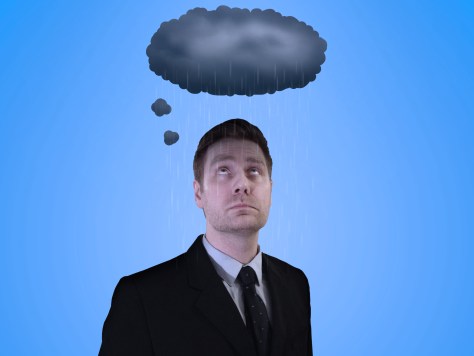A new study finds that everyone in this coffee shop is further into their manuscripts than you. Not only does their wordcount dwarf yours but their prose are free from the syntax, punctuation, and grammatical errors you’ve been struggling with for years. Researchers noted a stark contrast between the keyboard clattering on opposite ends of the room, clocking your competition at 75 words per minute and you at 5 audible sighs within the same time frame. Analysis shows you spend most of your time in a Wikipedia rabbit hole trying to cobble together the forensic science background necessary to write your mystery in the span of an afternoon.

THEY’RE MORE INSPIRED THAN YOU TOO
The same study finds everyone in this coffeeshop has clearer visions of what they’re writing than you do. While you’re playing at William S. Burroughs, writing non-sequential scenes you figure you’ll fuse together with exposition, they are drawing from plans workshopped in advance. While you whisper to captive audiences behind the counter, “It’s this franchise meets this franchise,” as if you’ve cracked the intellectual property formula for infinite riches, they are drawing from inspirations exclusive to written mediums. While you stutter through an introduction to the cloning technologies that govern your sci fi universe, they are pitching easy to digest high-concepts in thirty seconds or less.

THEY ARE WAY MORE INTERESTING THAN YOU
The study finds that everyone else in this coffee shop has lived more authentic lives than you too. Each of them have traced their heritage back to their homelands, which they’ve backpacked from starlit mountain trail to candlelit youth hostel. They’ve embraced foreign cultures,cuisines, and customs to the extent that they could teach them.
They’ve hitched rides with weapons smugglers, hopped trains on hallucinogens, and won marathons in hot air balloons. They’ve attended comet viewings with dress codes of robes, found spirituality at key parties, and burned effigies of themselves. They’ve hunted bigfoot in an abandoned insane asylum, headlined a DJ tent in a warzone, and got a job in food service for the story of it.
That’s why their stories resonate like they come from real places while yours feel cut and pasted from sitcoms that are still in syndication.

THEY ARE FAR MORE PASSIONATE LOVERS
The study shows that every writer around you will make superior romantic partners than you too. This is due too their broader emotional range and the intensity in which they express their feelings. Their last whirlwind relationship was filled with livestreamed arguments, a revolving door of side pieces, and public displays of makeup sex. Their voicemail is filled with thinly veiled wedding proposals, and their exes will do all they can to mold future lovers to look like them.
The writers around you have a wealth of characterization to draw from, having nurtured meaningful relationships with publishing insiders, residents of their local retirement home, and children at the orphanage where they volunteer. By contrast you keep your social circle thinner for fear somebody might dub your posse a “sausage party.” The lion’s share of your lines come from action movie stock-phrases and Tinder dates you’ve eavesdropped on.

PEOPLE FIND THEM WAY MORE INTERESTING THAN YOU
The study concluded that when compared to the authors around you readers are 50% less likely to ask where your ideas come from, 70% less likely to ask, “Then what happens,” and 90% less likely to punctuate a conversation with the obligatory, “I can’t wait to read it.”
The study, which draws from research from every coffee shop in a three-hundred mile radius of your apartment, concludes that you are the least accomplished writer in the greater Midwest. Even low earning freelancers would say you’d have to work harder to qualify as a “hack.”

THEY KNOW YOU’RE NOT TALENTED
The psychological component of the study shows that real writers can tell you’re an imposter, a pretentious illiterate who dubbed himself a “writer” as a conversation starter. They know you’re a poser storyteller who never once gotten a papercut from a paperback, that most of your imaginings are derived from videogames, and that most of your reading is done on reddit forums.

EVERYONE ALSO THINKS YOU’RE A CREEP
When attractive people happen through your sightline they assume you’re staring at them, undressing them with your eyes, and not daydreaming up your next plot device. Management has little debates on whether or not your overall vibe is grounds enough to ban you from coming back. E-sports gamers, who’ve setup tower computers and monitors in the booth behind you, steal glances between mouse clicks and think, “That mother fucker should really get his shit together.”

THIS STUDY IS IN LINE WITH PREVIOUS RESEARCH
Similar studies have found:
- All your exes have discussed your sexual performance and found it lacking.
- Everyone at your high school reunion assumed you’d pretty much turn out like this.
- And, no one you’ve thought about today has thought about you, literally not once.
Now it’s safe to conclude that the staff and all the patrons of your local coffee shop know that your novel is going nowhere. Conversely, everyone around you has the tenacity to power through their doubts. They have the perfect ratio of talent to energy to fortune to get the job done. Not only are they further into their manuscripts than you are (some by several drafts) they will all see their work in print, optioned for Netflix, and celebrated from every corner of pop culture. Don’t worry about them. Their legacies are secure.
Meanwhile, the study also predicts that your name will be expunged from search terms within a year of your passing.
Continue reading Study Finds Everyone in this Coffee Shop is Further into Their Manuscript than You






